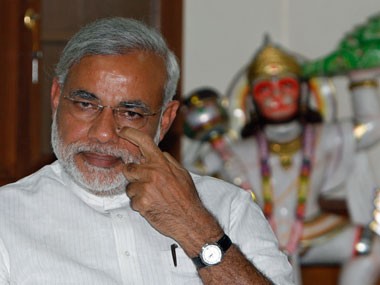
Gujarat Chief Minister Narendra Modi's remark on the high rate of malnutrition caused uproar, after the CM attributed the cause to beauty conscious girls and the number of vegetarians in his state.
In an interview with The Wall Street Journal (WSJ), Modi gave an unambiguous answer when asked about the prevailing malnutrition in Gujarat. "Gujarat is by and large a vegetarian state. And secondly, Gujarat is also a middle-class state. The middle-class is more beauty-conscious than health-conscious - that is a challenge. If a mother tells her daughter to have milk, they'll have a fight. She'll tell her mother, 'I won't drink milk. I'll get fat'," Modi said.
According to government data, almost half the children under five in Gujarat are malnourished. Modi's government will reportedly increase spendings on health workers to $340 million to distribute food supplements in a bid to tackle malnutrition and other related issues of the rural poor, the WSJ report said.
The CM's hypothesis was declared null by the Congress, with Arjun Modhwadia, who heads the Congress' Gujarat unit, saying according to NDTV, "This is not just a joke but is an insult to all women."
Besides discussing his rationale on malnutrition, Modi also brought up the need to change government policies in power sectors to avoid blackouts in the country. He said the country has to revive the liberalization process which began in 90s.
"Government has no business to be in business," he said. "The tragedy is that there's no liberalization going on."
The BJP strong man also restated that he played no role in the 2002 Gujarat riots, and refused to apologize for any wrong doings, saying that his hands are clean. Interestingly, a special court on Wednesday convicted 32 people including a former Minister of Modi's government in Narodya patiya case 2002.
Modi also talked about his wish to see Gujarat make room for defense -equipment manufacturing. In order to do this, he said he will take advantage of foreign defense contractors' need to invest huge sums in local ventures in exchange for getting multibillion-dollar contracts, the WSJ report said.

















